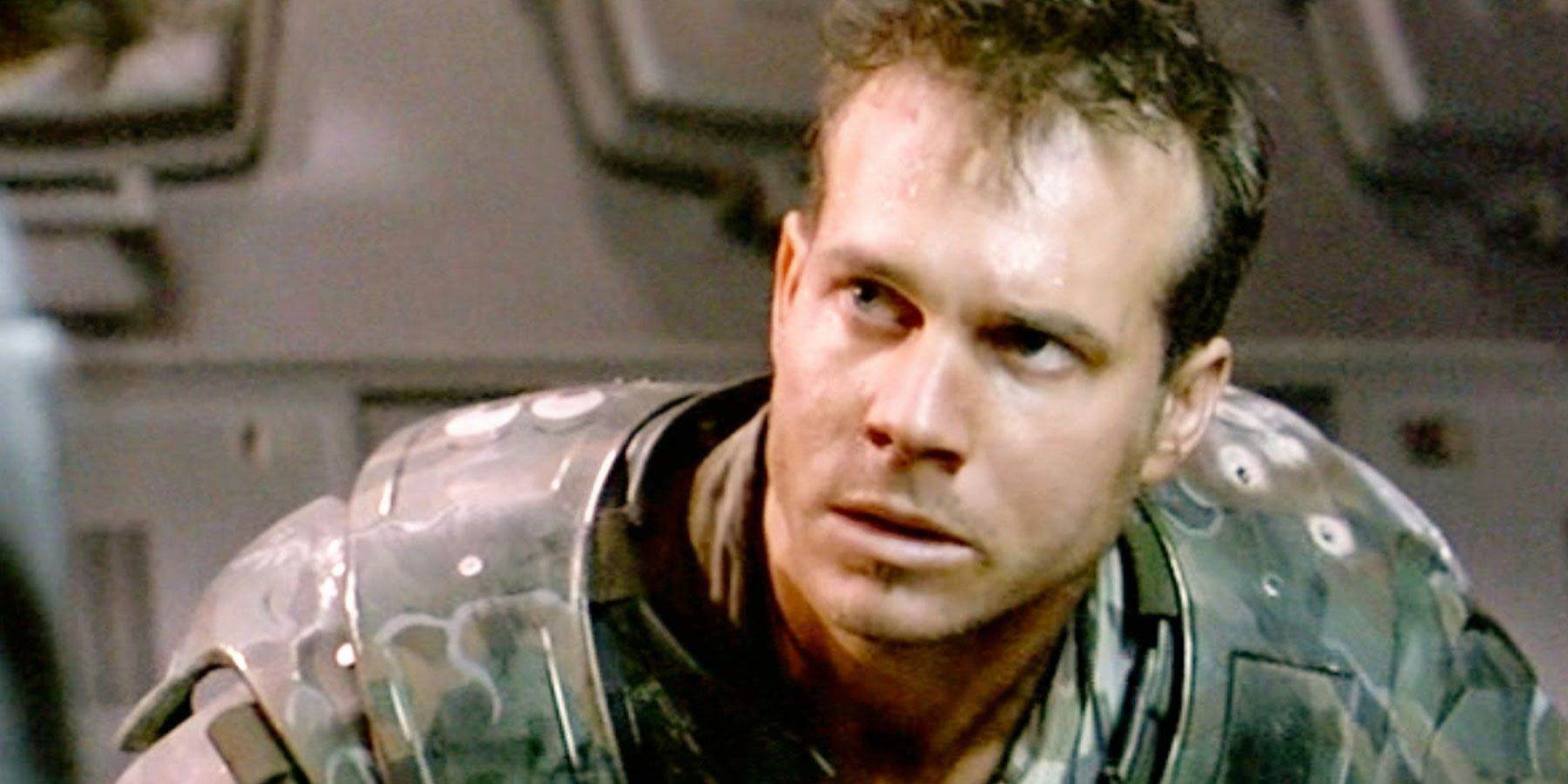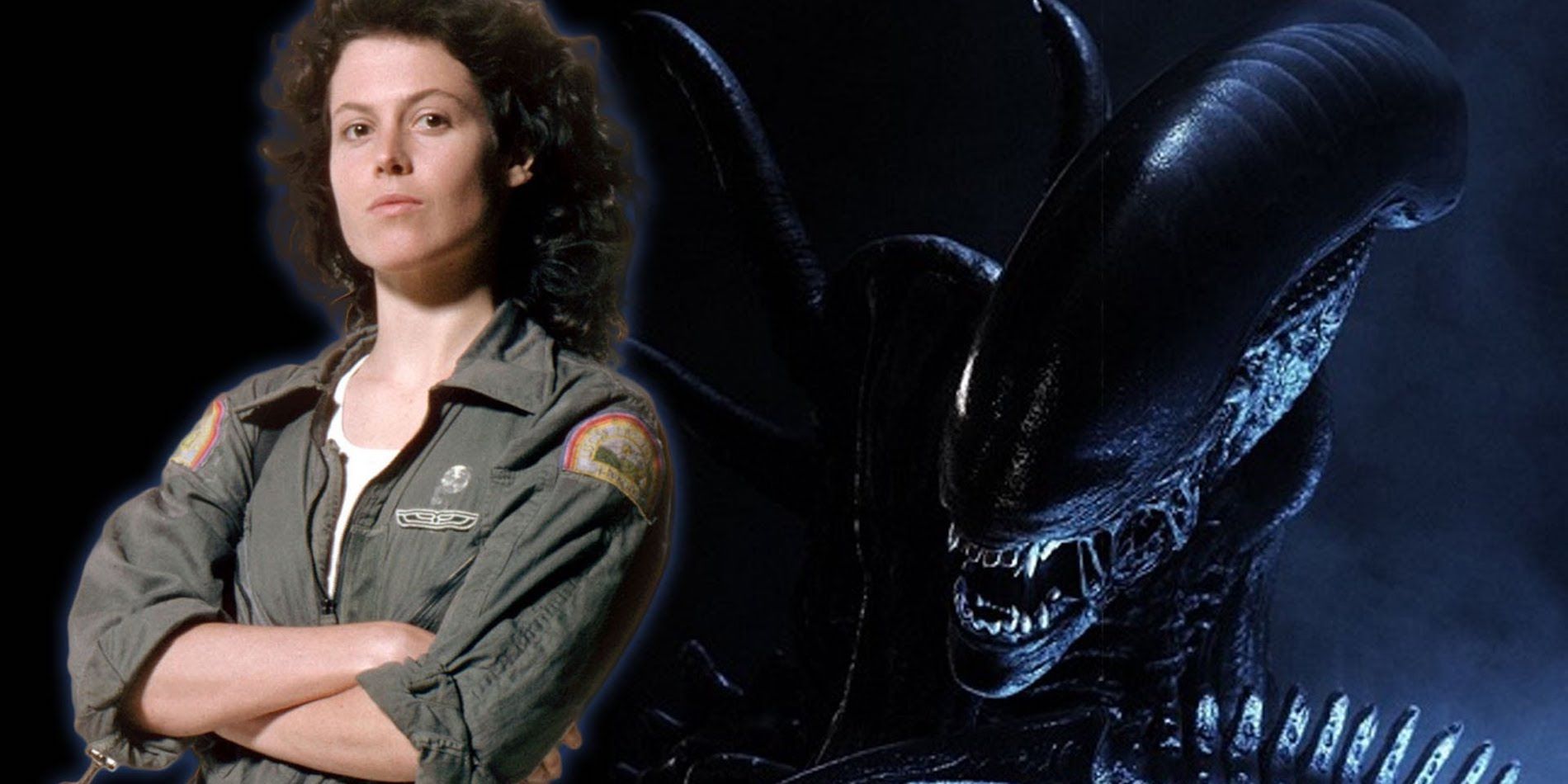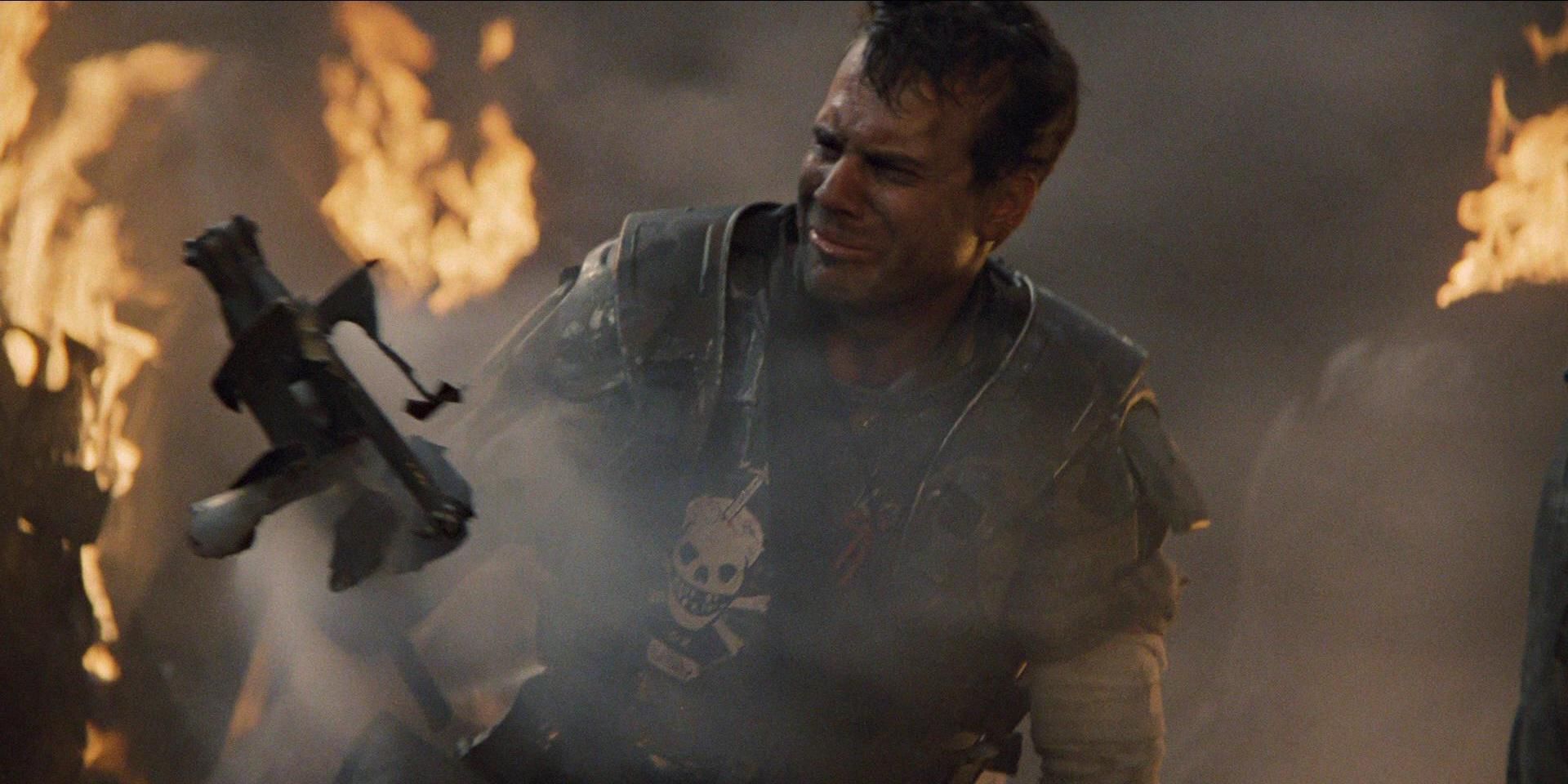
Although Ellen Ripley (Sigourney Weaver) emerges as the traditional stoic hero of James Cameron's Aliens (1986), Private Hudson (Bill Paxton) emerges as the more vulnerable, expressive, and relatable hero of the movie. Through her thorough mastery of powerful weapons and vehicles, her direct opposition to bureaucracy, and her unwillingness to express despair in front of her fellow survivors, Ripley demonstrates qualities befitting classical 1980s action heroes. Conversely, Private Hudson, by virtue of his lack of technological mastery, his reluctance to engage in combat, and his reliance on facetious language and sarcasm, emerges as the film's "everyman" hero--a relatable, unexceptional sort who, despite his many faults, still ends up making a noble sacrifice by the film's conclusion.
Both Aliens and Ridley Scott's original Alien were released during an era in which blockbuster action roles were occupied almost exclusively by men. Although action-oriented female characters like Ripley and Sarah Connor from The Terminator franchise were beginning to appear, viewers were far more used to seeing muscular, militaristic men engaging in spectacular acts of onscreen violence. This trend continued throughout the mid and late 1980s, with action stalwart Arnold Schwarzenegger taking the spotlight in films like The Terminator, Commando, and Predator.
The Alien franchise marks a crucial sea change in popular action movies, in that Ripley ends up thriving as a female action hero; however, Aliens presents another atypical hero figure in Private Hudson, a character who ends up being both heroic and relatable despite the fact that he is far less capable than Ridley.

Ripley displays the characteristics of the "stoic" 1980s action hero because she's assertive, she's cool-headed, and she displays a high level of mastery during combat situations. In fact, the original Ripley was written as a male character until Ridley Scott decided to vary up the standard male action star model. The audience gets a sense of Ripley's assertiveness early in the movie, when she upbraids a crew of Weyland-Yutani executives for doubting her claims to have encountered hostile alien life. Rather than relenting, Ripley risks insubordination by asking, "Did IQs just drop sharply while I was away?" Throughout the film, Ripley openly defies bureaucracy and poor leadership, even when it comes to those who outrank her. Viewers are likely to admire her for resisting authority figures in ways that they often can't in their day-to-day lives.
Although she's clearly still very traumatized by the events of Alien, Ripley suppresses her fears when she's among the Colonial Marines and the colonists of moon world LV-426. Rather than conceding to panic, Ripley relies on rapid problem solving and decisive action. During a scene when Ripley and company watch their would-be rescue dropship crash due to a Xenomorph hijacking, it's Ripley who orders the Marines to run for safety while the others stare in disbelief. It's also Ripley who masterminds a strategic chokepoint for attacking aliens in LV-426's processing station, and it's Ripley who works out the fact that the corrupt Weyland-Yutani Corporation's Special Projects Director Carter Burke (Paul Reiser) attempted to sabotage Ripley and the Marines. This ability to think clearly under pressure helps distinguish Ripley as a worthy hero and an unflappable stoic.
Finally, Ripley shows high mastery of military technology. When her superiors carry out treacherous orders, Ripley not only absconds with an armored personnel carrier, but also uses it to crush a charging Xenomorph. When Cpl. Hicks (Michael Biehn) teaches Ripley how to use a rifle, Ripley proves deadly almost immediately. Most importantly, Ripley proves to be a savant with the power-loader, a mechanized robotic suit that she uses to eliminate the alien queen in a spectacular display of pugilistic skill. Ripley's diverse palette of traditional heroic abilities marks her as the idyllic, capable action hero, though it might also make her so capable that she becomes less relatable overall.

In contrast, Private Hudson qualifies as a more relatable, "everyman" hero because he allows open expression of his fears and insecurities, he lacks assertiveness, and he lacks the kind of technical prowess displayed by heroes of Ripley's ilk. Hudson's constant complaints border on cowardice, but they also make him expressive and endearing. When the hijacked dropship crash lands, ruining Hudson's chance for rescue, Hudson famously laments, "Game over, man. Game over!" Put bluntly, Hudson is terribly fearful and insecure. When the movie's Xenomorphs (inspired by the artwork of H.R. Giger) show up, Hudson panics, loses heart, and lashes out with his sarcasm and sardonic wit instead of taking action. But that's also what makes him relatable. Wouldn't most viewers end up like Hudson if they were forced to engage a pack of bloodthirsty Xenomorphs?
Hudson also lacks Ripley's high aptitude with military vehicles and firearms. He does prove competent as a recon specialist and a radar operator, as he shows by pulling up schematics on the processing area and operating tracking equipment to keep tabs on approaching Xenomorphs. The problem is that Hudson never takes the initiative; inevitably, he takes action only after Ripley has asked him to do so. Hudson is often incapable of taking charge, and therefore doesn't fit the traditional hero mold.
What redeems Hudson and qualities him as a hero is the fact that, despite his crude jokes and false machismo, he ends up making a worthy sacrifice for the movie's third act. When Xenomorphs descend from the ceiling in the processing area, Hudson takes a valiant stand. Channeling a somewhat less gruesome version of Capt. Rhodes' death from George Romero's Day of the Dead, the Xenomorphs finally drag Hudson through a floor grating and presumably kill him. Hudson expires not with a whimper, but with grit and tenacity, firing his weapon until the final instant. He avoids a pitiful death by stifling his doubts, taking action, and going out on his proverbial shield. Many viewers are likely to identify with Hudson's "hero for a moment" characterization, while Ripley's more stoic and consistent form of heroism indicates rare qualities that the average viewer can't pretend to possess.
Though Cameron is no longer at the helm, the Alien movie franchise lives on with Ridley Scott's Prometheus and Alien: Covenant. Viewer opinions on these movies remain divided, and even Scott seems to be struggling to keep the saga fresh. Both Alien and Aliens broke important ground by casting Sigourney Weaver as an action hero in a genre previously dominated by men. Ripley remains an iconic character to this day, which suggests that her brand of stoic heroism is still a hit among viewers. It's also worth noting that Private Hudson remains at least as quotable today as Ripley; his demoralized "Game over!" line has spawned countless memes and has appeared in a number of film and TV show references. Perhaps that's an indication that, while viewers respect and appreciate Ripley as an effective, immaculate hero of the most elite caliber, they can better identify with Hudson's very plausible and very human lack of courage under pressure.
https://ift.tt/2z5mueA
October 29, 2020 at 05:00AM




